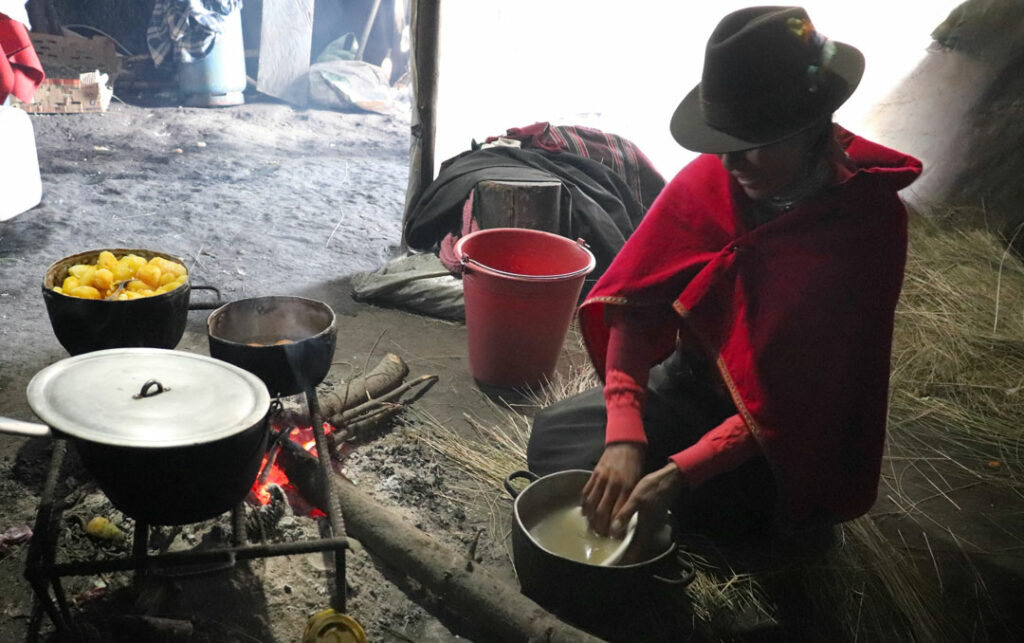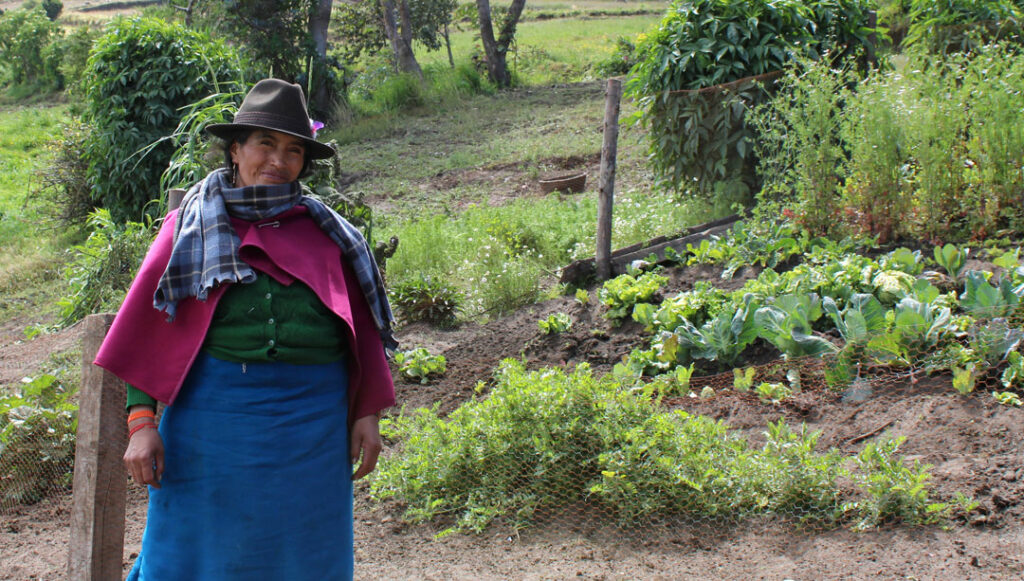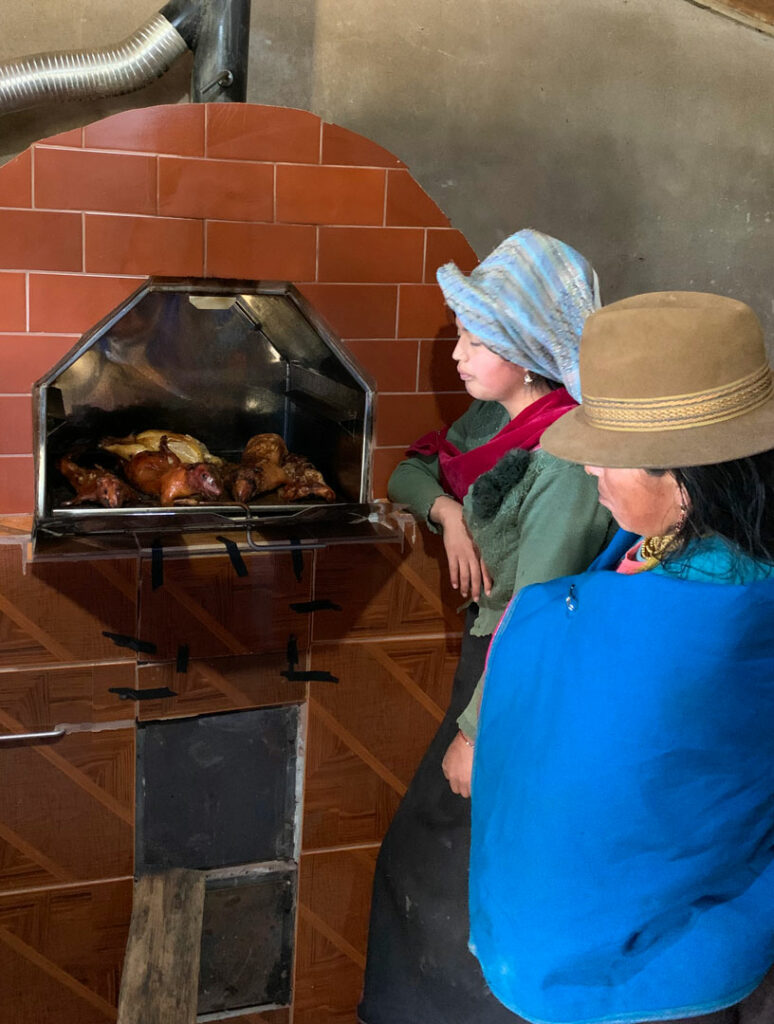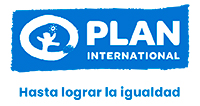The highland women working to improve their lives in the Ecuadorian Andes
Near the colossal Chimborazo volcano in the Ecuadorian Andes are a number of communities where Plan International has been working for several years.
The region is abundant with crops, greenery and beautiful landscapes. In the summer, the wind blows stronger and the sky turns a myriad of different shades, illuminating the faces of the indigenous people who live here, lighting up the bright colours of their clothing. But this picture perfect scene contrasts sharply with the reality of Chimborazo province, which historically is one of the poorest in Ecuador.
In one highland village we meet a group of 18 women who proudly tell us how their lives have changed since they started working with Plan International on a project to improve their lives, promoting well-being and happiness.
“This is an innovative project because it is based on the women’s well-being and on what makes them happy,” explains project coordinator Fanny Yaucen.
Most of the Indigenous women are unable to read or write and their access to basic services such as education and health is limited. The group call themselves the ‘Wiñari’ which in the Quichua language means ‘to grow,’ something the women can attest to.
A year ago, the women were introduced to the ‘Life Improvement Approach,’ a methodology developed by the Japanese Cooperation (JICA) which encouraged the group to identify their problems, devise solutions and implement them.
Supported by Plan International, the women took part in workshops over a two month period to help them identify what changes would make their lives better. During the sessions they were asked to reflect on what they would need to be happy, in relation to their own well-being, surroundings and way of life.
“At my age, I had never taken part in a workshop like this one. We were asked to draw, think, and talk about what we needed most, what we are doing and what was going to make us happy,” shares Ramona, one of the Wiñari women.
As the project took shape, the women began to take ownership of it. They organised introspection exercises that helped them understand their priorities and strengths, as well as recognise that they had to do the work needed to achieve happiness.

In the community where the women live, the wood burning stoves are located at ground level in very dark huts, separate from the rest of the house. The smoke and poor air circulation often causes eye infections and being forced to crouch over the fire pit means the women suffer from chronic back pain.
Another issue the women identified as being detrimental to their lives is the lack of access to water in their kitchen huts which means they have to carry heavy loads of water for cooking and washing food each day. In addition, access to food is limited, and to eat a more varied and nutritious diet, the women have to travel for several hours to reach the nearest town.
Having identified the biggest issues affected their lives, the women set about developing an action plan which addressed four key areas: the need for stoves at a comfortable height; accessible water sources; vegetable gardens where they could grow a wider variety of crops and financial security.
With the support of Plan International, the women visited the Mashcana Foundation where they learnt how to construct ecological stoves and were taught to use alternative fuel sources such as molasses, straw, manure and peat which reduce indoor air pollution and improve the health and well-being of people.
“The most important thing is that our health will be much better, and our lives will change. Because of the smoke, it will no longer affect our eyes and our lungs; it’s a different kind of life,” explains project participant Dolores.

Thanks to the reduction of smoke from their new stoves, the women were able to bring their kitchens into their houses. They redesigned their homes to provide space for the stove and built sinks with taps so that access to water was easier, and they could cook, wash food and their hands with greater ease.
“Due to the lack of money, sometimes we did not know how we would be able do it because we needed materials for the construction, but we managed. We looked for trucks and we went to the municipal office to request funds for the construction of the taps,” explains Dolores.
Next on the women’s agenda was to establish a vegetable garden so they would no longer have to travel many hours into town to buy fresh food. However, the high altitude where they live meant they needed to surround the plot with a hedge to create a microclimate and protect their crops from the wind.
The women planted chard, beetroot, cauliflower, onions, lettuce and medicinal plants. “We are growing organic plants with our own hands and now have vegetables to eat with our families, so we have money left over for other things,” says Felipa.
Finally, the women wanted access to financial resources. To this end, they set up a savings group that would enable them to access loans and save for the future. So far, the groups has been able to provide loans of up to $1,000 at low-interest rates and with zero default.
Eight months on, 10 of the 18 women have their new ecological stoves and redesigned kitchens, and the remaining eight women’s kitchens are nearing completion. It’s expected that by the end of 2023, all of them will be finished.

One of the women, María Teresa, who already has her new kitchen, tells us that she recently sent her nephew, who lives in the United States, some delicious baked guinea pigs. “First, we seasoned them, then we cooked them, and in the afternoon, we dropped them off at the shipping office. It made me very happy to hear that my nephew liked the guinea pigs very much.”
The lives of the 18 women taking part in this project have been truly transformed. Their homes are warmer, their back pains and eye infections have decreased, and they are able to provide their families with more nutritional food. The savings group gives them peace of mind and provides them with access to financial resources to grow their businesses and save for the future.
The new knowledge the Wiñari women have acquired over the past year and the entire process they have undergone has given them more self-confidence and the conviction that they can improve their lives if they set their minds to it.
“The purpose of the project was to strengthen the capacity of the women so they were able to reflect, plan and act to improve their life situation,” says David Alvarado, manager of Plan International’s office in Chimborazo.
“What I love about this project is that it does not end, because once you have the stove, the water, the garden, the hedge and the savings group, then you have to think about what other things you need in life and start working for it. You already know that you can do it. It’s not a question of money; it’s about being creative, innovative, and of knocking on many doors,” explains Rossana Viteri, director of Plan International Ecuador.




